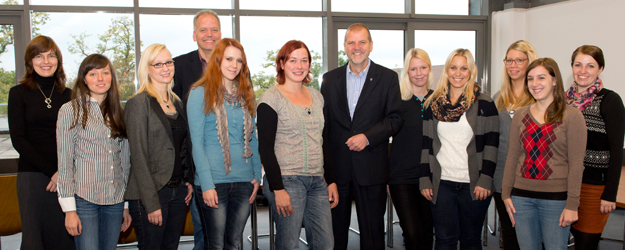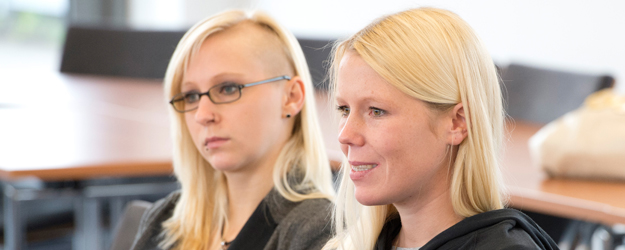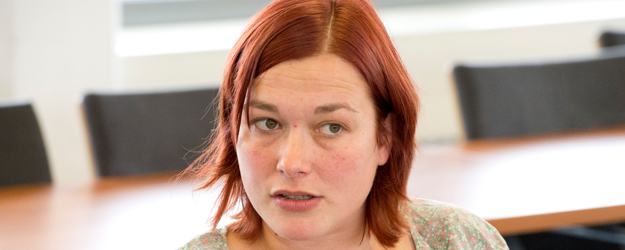26 October 2012
The Prison Group of the Department of Criminology, Juvenile Criminal Law, the Penal System, and Criminal Law of Johannes Gutenberg University Mainz (JGU) has a long history – and a successful one. Students get to experience what it is like behind bars, and prisoners on remand get to have contact with the outside.
Something Jennifer Weimann often hears when she talks about her special involvement is: "What, you're going to jail? It’s all monsters." But the law student can only smile at such words – she knows better. She has gotten to know all kinds of people behind bars. Monsters were not among them.
Weimann belongs to the Prison Group, an organization with a long tradition at the Department of Criminology, Juvenile Criminal Law, the Penal System, and Criminal Law at JGU. Professor Dr. Alexander Böhm, a former director of a juvenile detention center, first formed the group in 1985. He felt it important that his students, who would later often be working as state prosecutors or judges, should have the opportunity to have face to face contact with prisoners. After his retirement, Professor Dr. Michael Bock, Böhm's successor in the department, is continuing to run the project.
Visit by the Minister of Justice
Ten law students currently belong to the Prison Group. Saskia Kersieck, who works for the department, supports them in their work as volunteer prison visitors. The group has just been visited by the Rhineland-Palatinate Minister of Justice, Jochen Hartloff, now they are sitting together over coffee and rolls.
"The Minister did not want any media attention," Kersieck says. "He just wanted to talk to us about our work and thank us for our involvement." Hartloff had planned for an hour, but it turned into an hour and a half – unsurprisingly, since there is much to tell about the Prison Group.
Once a week, eight prisoners awaiting trial at the Correctional Facility in Rohrbach are visited by students from Mainz. There is a long waiting list to participate in this "open discussion group." It is a welcome change in the prisoners' otherwise rather monotonous daily routine.
Conversations at the Correctional Facility in Rohrbach
"We are met at the entrance," Lisa Bayer explains. Visitors are subject to a strict inspection process. "We have to leave our keys and cell phones behind. Then we are led into a rather bare room with a TV mounted high up in one corner." But the TV stays off.
"There are days when we just play a card game, have fun, and laugh," states Bayer. "We also talk with each other a lot," adds Natascha Becker. "As law students, we are not permitted to give legal advice, but we can explain what the conditions are for day release, for example."
Again and again the prisoners awaiting trial talk about what they did in the past, sometimes remorsefully, sometimes defensively. "But if someone starts justifying what he or she did, then we start probing more critically," claims Becker. "There was a pimp who tried to tell me that prostitution is good for women. I told him straight out that no woman thinks prostitution is fun and that I think it is appalling."
Many miss their families
However, situations like this are fairly rare. "A much larger issue is the family, which plays a role in how prisoners react to incarceration. Many have children and suffer incredibly because of the separation."
But what is it then that takes these young law students back to the slammer time and again? "I do not see these people as cases," declares Susan Weltz. "I really want to understand what it is that made them behave as they did. What happens to those who are convicted? It is important for me to know, because in future I will very probably find myself committing someone to prison." "In my case, however, it was just curiosity," says Natascha Becker. "After all, you only otherwise see prison on TV. What are prisoners like in reality?"
They need someone who listens to them
Kerksieck explains: "When people apply to join the group, I look to see if there is genuine interest, a certain openness. Visiting a prison is not like visiting a zoo."
"You need a social awareness," believes Bayer. "Empathy is also necessary. I think that, like most people, prisoners on remand fairly quickly realize who they can and cannot talk to."
The JGU Prison Group is enriching for the inmates of the detention center, and the director, Norbert Henke, is happy about the involvement. "The students are actually promoting public awareness," he says. "We want it to be more widely known that it is possible to be a volunteer prison visitor. In addition, the conversation group is an opportunity for the prisoners to speak with someone from the outside. The most important thing is that there is someone there prepared to listen to them."
Balance between closeness and distance
Henke praises the group for the way it manages to maintain the necessary balance between closeness and distance. "I am grateful for their work. If only I had more people willing to do this."
Four students will again be making their way to Rohrbach this evening. This is not something they are being forced to do; they are going willingly. Perhaps there will be another card game, perhaps the young man with the disabled child he so seldom sees will be there again. But one thing is certain: there won't be any monsters waiting for the JGU students because there are no monsters at the Correctional Facility in Rohrbach.




